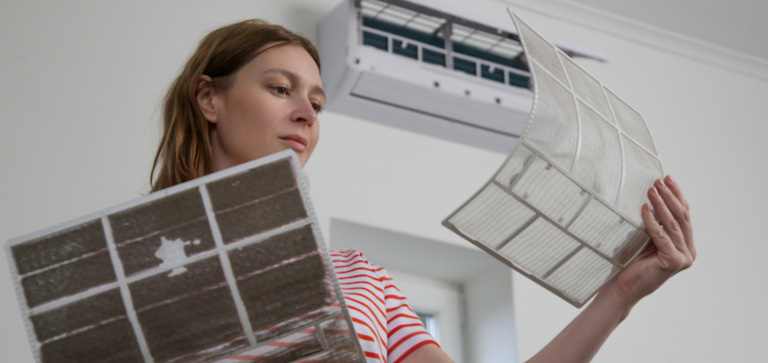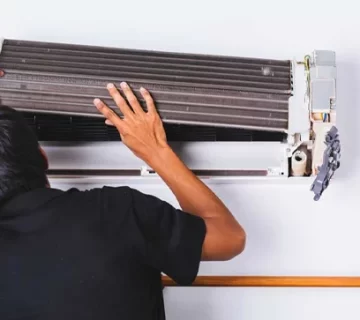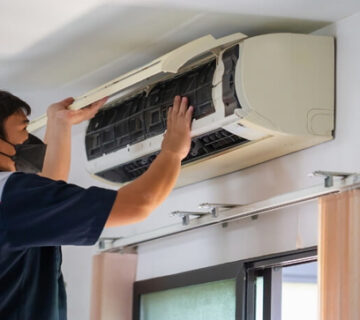Ensuring the best efficiency and indoor air quality requires regular maintenance of your air conditioner’s air filters. It is important to do routine inspections, cleanings, or filter replacements on a monthly basis, usually more frequently during times of high demand. Following the manufacturer’s guidelines is essential, considering whether your filters are disposable or reusable. Easy and efficient procedures include choosing the appropriate filter type and size, turning off the air conditioning before doing maintenance, and labelling the expiration date on temporary filters.
To further extend the life of your HVAC system and create a healthier living space, think about upgrading to higher-efficiency filters and arranging for professional maintenance. You are able to ensure that your air conditioner is operating at its maximum effectiveness and providing clean, comfortable air throughout your house by including these simple measures into your daily routine.
The efficiency and performance of your air conditioning system are greatly dependent on the proper care and upkeep of your AC air filter. The operation of the AC unit could be affected by dust, debris, and other impurities when regular inspections and quick cleaning or replacement of the air filter are performed. In addition to decreasing the system’s airflow, a blocked or dirty filter makes the system work harder, which could result in more expensive electricity and utility bills.
Maintaining your AC air filter carefully can not only increase the useful life of your HVAC system but also improve the quality of indoor air. This modest but important portion serves as a first line of protection, absorbing dust particles that may otherwise find their way throughout your house. To provide a cool and clean environment for you and your loved ones, develop the practice of checking and maintaining your AC air filter on a regular basis.
Here are some simple maintenance tips for AC air filters:
1. Regular Inspection
• At least once each month, and especially during periods of high consumption, check your air filter.
• You might require examining it more than usual if you live in a dusty area or have pets.
2. Cleaning or Replacement
• Clean your filters as directed by the manufacturer if they are reusable. Usually, you can give them a quick wash, allow them to air dry, and then replace them.
• Replace any disposable filters you might have in accordance with the manufacturer’s instructions. Usually, this happens every one to three months.
3. Filter Type
Make sure the air filter you use meets the requirements for the HVAC system you have. The user handbook or the device itself often indicate the suggested filter type.
4. Filter Size
Verify that the filter fits into its position correctly. An inappropriately sized filter could make the system work harder or enable unfiltered air to pass through.
5. Turn Off the AC Before Maintenance
Before attempting to clean or replace the filter, be sure the air conditioner is turned off. In addition to guaranteeing your safety, this safeguards against system danger.
6. Location
Know where your air filter is located. Usually, it’s found in the screen or air returning flow. If you are not sure where to look for the manual labour, see your device’s manual.
7. Mark the Replacement Date
If the filter is a disposable resource, mark down the replacement date right on the filter itself. This allows you to quickly see the last time it was changed.
8. Consider Upgrading
Upgrade to a higher-efficiency filter, like a pleated or HEPA filter, if your current fibreglass filter is simple. To be sure your HVAC system is capable of handling the higher resistance to airflow of a more efficient filter, verify the requirements.
9. Professional Maintenance
Make time for your HVAC system’s routine maintenance by a professional. In addition to a complete cleaning and inspection, the expert can provide you with air filter maintenance guidance.
10. Monitor Air Quality
Keep an eye on the overall condition of air that circulates in your house. Should you observe a reduction in the quality of the air, it might suggest that your filter need maintenance.
Conclusion:
It is impossible to underestimate the importance of regular maintenance for the air filters in your air conditioner. By implementing these easy though efficient methods into routine, you can extend the life and performance of your HVAC system and ultimately promote indoor air quality. The implementation of important practices such as routine inspections, appropriate cleaning or replacement, and the selection of suitable filter types and sizes enable homeowners to assume responsibility for the system’s operation.
People who maintain their filters actively not only encourage ideal airflow and energy efficiency but also provide protection against future failures. In addition to providing cool or warm air as needed, a well-maintained air conditioning system also maintains good indoor air quality, making a home comfortable and health conscious.



